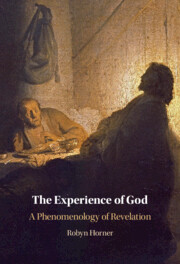Book contents
- The Experience of God
- The Experience of God
- Copyright page
- Contents
- Acknowledgements
- Part I The Problem in Context
- Part II Revelation in Contemporary Philosophy and Theology
- Chapter 3 Revelation as a Philosophical Problem
- Chapter 4 Revelation as a Theological Problem I
- Chapter 5 Revelation as a Theological Problem II
- Part III The Event of Revelation
- Part IV The Event in Person
- Bibliography
- Index
Chapter 3 - Revelation as a Philosophical Problem
from Part II - Revelation in Contemporary Philosophy and Theology
Published online by Cambridge University Press: 13 October 2022
- The Experience of God
- The Experience of God
- Copyright page
- Contents
- Acknowledgements
- Part I The Problem in Context
- Part II Revelation in Contemporary Philosophy and Theology
- Chapter 3 Revelation as a Philosophical Problem
- Chapter 4 Revelation as a Theological Problem I
- Chapter 5 Revelation as a Theological Problem II
- Part III The Event of Revelation
- Part IV The Event in Person
- Bibliography
- Index
Summary
In Chapter 3, I consider several ways in which philosophical discourse has become allergic to the concept of revelation. While Catholic theology is largely dependent on scholastic and, more recently, modern philosophy as it tries to articulate understandings of faith, philosophy has been part of shaping a modern and postmodern culture that is frequently hostile or simply indifferent to religious faith and its notions of divine revelation. Various philosophical approaches seek to exclude theology from the realm of academic discourse, either because revealed religion is seen to be partial and therefore detrimental to the pursuit of universal wisdom, or because it seems to articulate merely its own will to power, using a metaphysics that is oblivious to having founded itself. Bound up in metaphysical systems, all discourse potentially becomes (onto-)theological. 'Religion' has recently returned in philosophy only by means of its transformation: used in Levinas’ sense as the ethical relation with the other, it effects a powerful critique. Yet, excluding the very particularity of religious traditions is a totalitarian and secularising act.
Keywords
- Type
- Chapter
- Information
- The Experience of GodA Phenomenology of Revelation, pp. 41 - 60Publisher: Cambridge University PressPrint publication year: 2022

